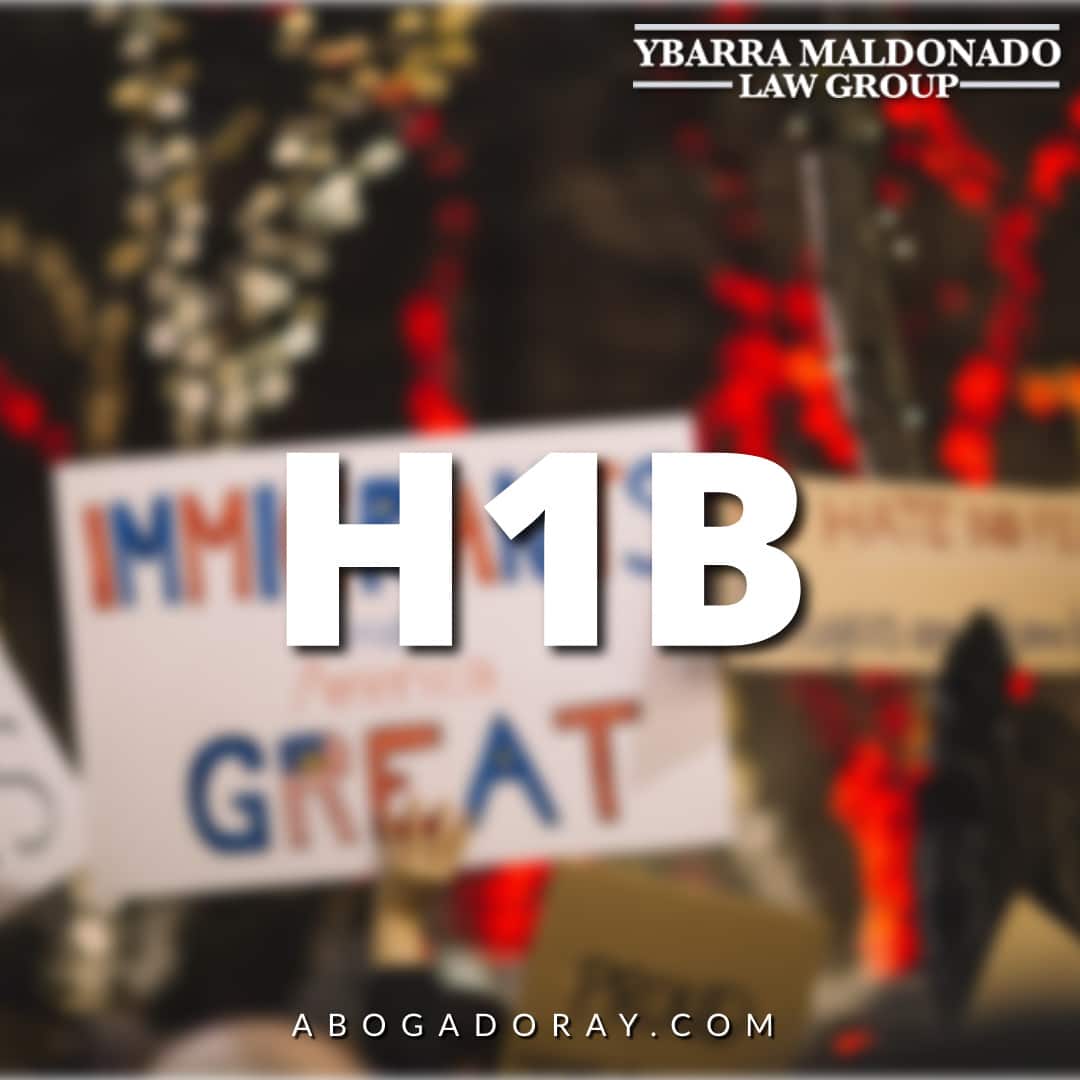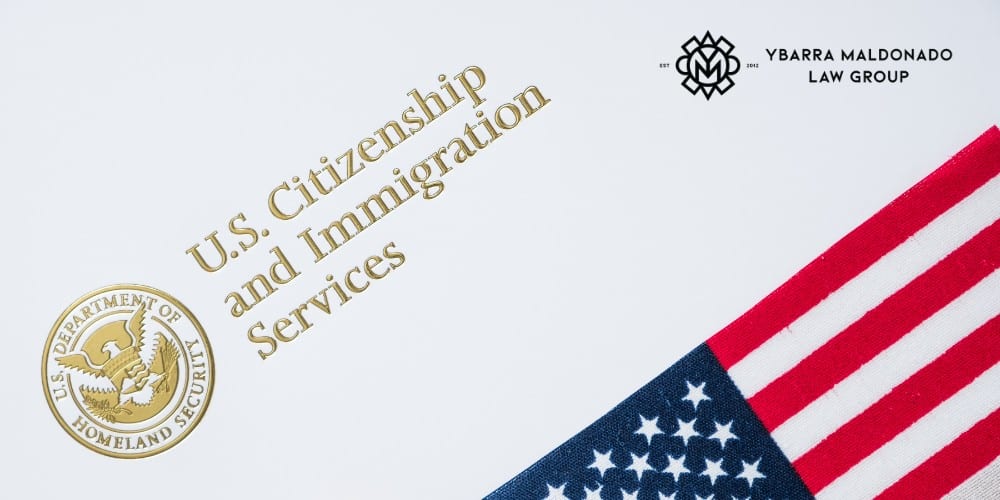H1B Visa Attorney in Phoenix, AZ

DON’T HESITATE TO REACH OUT TO US!
Our Law Firm is committed to becoming the best Law Firm for Latino, migrant, and Spanish speaking communities in Arizona.
H1B Immigration Attorney in Phoenix

Do you need help with getting an H-1B visa in the state of Arizona? At Ybarra Maldonado Law Group, we take great pride in being the top immigration attorneys in Phoenix, AZ. Ray A. Ybarra Maldonado has been instrumental in many civil rights lawsuits and immigration cases over his career.
Every immigrant worker in the United States who is working on an H-1B visa knows that there’s a limit to how long they can remain in the country on this visa.
The H-1B visa allows qualified foreign workers to be employed in the United State for a maximum of six years. After this time limit, they have 2 options:
- Go back to their home country or
- Adjust their status to permanent residency
In order to become a permanent resident of the United States, you must transition from an H-1B visa status to a Green Card status.
H-1B visas are sought-after work permits for skilled workers living in the United States. They allow employers to maintain American competitiveness in the global economy and workforce. It also allows employers to fill occupations that cannot otherwise get filled by the U.S. workforce alone.
If you’re curious about an H-1B visa, what it means, and what it can do for you, you’ve come to the right place. Here, we’ll break down the aspects of this permit and what’s required of you to get one. Our Phoenix-based immigration law firm has years of experience in successfully representing immigration cases while prioritizing every attorney-client relationship. We are more than prepared to help you start and complete your H-1B visa application.
What Are H1B Visas?
H-1B visas are basically work permits that allow a foreign worker to obtain U.S. employment for a certain period of time. The visa grants U.S. companies the ability to employ workers in a specialty occupation. These occupations might include:
- Accounting
- Architecture
- Engineering
- Financial institutions
- Information Technology (IT)
- Mathematics
- Medicine, biology, or science
As a general rule, any graduate-level profession that requires a bachelor’s degree or a higher degree requirement might fall under H-1B visa qualifications. In the case that you don’t have a bachelor’s degree, you may still qualify under certain conditions. If you can prove that your work experience or skills are equal to that of higher education, you may be able to attain this visa.
Individuals cannot apply for H-1B visas by themselves. They must ask an employer to submit the paperwork on their behalf.
What’s the Difference Between an L1 Visa and an H1B Visa?
Both L1 and H-1B are nonimmigrant worker visas that allow foreign nationals to obtain U.S. employment. However, the two visas differ in a few key ways.
- An L1 visa is also known as an Intra-Company Transferee Visa. It allows large companies with operations in different countries to temporarily move their employees to the U.S. These specialty occupations come in two different categories: L1A and L1B. L1A encompasses any managers or executives in the company. Workers with related work experience or specialized skills fall under the L1B category.
- L1A Visas allow 7 years in the U.S., while L1B allows 5 years.
- Unlike with H-1B visas, there’s no limited number allowed in each year for L1 Visas.
- Both employees under L1 and H-1B visas are able to apply for green cards during their U.S. employment.
- Only those with H-1B visas are able to invest in the stock market or buy/sell property in the U.S.
The H-1B Cap
There is a limit to the number of H-1B visas allowed each year. This is what’s referred to as the H-1B cap. The number caps off at 65,000 available permits. Of these, 20,000 are strictly limited to those who’ve received a master’s degree or higher education from an American university or college. An employee who has already received an H-1B visa is generally exempt from this numerical cap.
Who is Eligible for H1B Visas?
There are several requirements for those seeking H-1B visas. As previously mentioned, you must have a bachelor’s degree, other higher education, or you must be able to prove comparable work experience. You also must get a Labor Condition Application, or LCA, before filing your H-1B visa. You can get an LCA from the U.S. Department of Labor.
H-1B Portability Provisions
Someone who currently has H-1B status isn’t limited to a single employer. Under the American Competitiveness in the Twenty-First Century Act, employees are able to make use of portability provisions. In other words, an employee is able to transfer their H-1B status to different employers and remain eligible.
Can an Individual of H-1B Status Have a Spouse or Child in the U.S.?
Any spouse or minor children of a person of H-1B status can live and become students in the United States under H-4 status. They may also receive a driver’s license and open a bank account, but they aren’t eligible to work.
How Long Does an H1B Visa Last?
The H-1B visa has a duration of at least six years. It’s issued by the United States Citizen and Immigration Services (USCIS) in increments of up to three years.
If an employee under the H-1B visa is applying for permanent residency by obtaining green card status, they may be able to receive an extension. A Phoenix H-1B lawyer can help you determine the length of your visa and how you can request an extension.
What is Covered Under the Federal Fair Labor Standards Act?
The federal Fair Labor Standards Act (FLSA) applies to all U.S. workers, even qualified foreign workers. Basically, this act establishes minimum and prevailing wage, record keeping rules, and overtime rules. The FLSA also sets guidelines for employed minors in the U.S.
How Can I Avoid Deportation With an H1B Visa?
Even under foreign work visas such as an H-1B, there is still a fear of deportation. Deportation might occur for several reasons, one being that the federal government denied your H-1B transfer or requested a time extension. If the federal government denies either of these, you’re no longer legally employed in the U.S. and will be subject to deportation. To avoid this outcome, you should make sure you correctly fill out the right documents and file them before your visa expires.
Another reason you may face deportation is if you’re convicted of a crime that’s considered grounds for deportation. These crimes can either be aggravated felonies or “crimes of moral turpitude.” To avoid deportation for a criminal act, you need a criminal defense lawyer. Luckily, Ybarra Maldonado Law Group specializes in criminal defense for immigrants in the United States, among many other legal services.
In today’s day and age, the Coronavirus pandemic has left many people without jobs. While U.S. citizens are able to receive unemployment benefits, immigrants cannot. Those on foreign work visas who have lost their job due to COVID-19 have very few options. They must quickly find a similar U.S. occupation that’s hiring, or else they could be deported.
How Can I Stop Removal Proceedings?
If you’re threatened with deportation, there are ways to stop removal proceedings. If you received a criminal conviction that isn’t an aggravated felony, you can apply for a cancellation of removal, a refugee waiver, or a 212(c) waiver.
Another way to stop removal proceedings is to make an asylum case. These cases are often complex, so be sure you consult with an asylum attorney. You might have an asylum case if you fear that returning to your country could be harmful to you for the following reasons:
- Punishment for political activities
- Religious persecution
- Nationality
- Membership in a group or race
There are also other ways to stop removal proceedings that depend on certain requirements. Ask your H1B lawyer what these requirements are and whether you meet them.
Do H1B Visas Lead to a Green Card?
H-1B visas are non-immigrant visas, so they’re not the same thing as a green card. But they can lead to green card status.
Applying for a non-immigrant visa generally takes much less time than applying for a green card. This quick process is ideal for companies wanting to hire foreign employees for the long term.
Non-immigrant visas like H1B’s and L1’s are both of dual intent. This means that you’re given the option to apply for green card status while under those permits.
The transition from an H1B to a green card can be a very difficult process. Adjusting your status can take serious planning due to its complexity and lengthy process. It may take anywhere from 6 months to a few years to obtain your green card.
To help make this transition easier, we recommend having an experienced immigration lawyer from Ybarra Maldonado Law Group on your side. We can help make sure you’re on the right track to green card status and permanent residency in the U.S.
How to Get an H1B Visa
In order to get an H1B visa, you’ll need to complete the following:
- Find an H1B sponsorship
- Ask your employer to submit the labor conditions approval
- Once approved, ask your employer to submit Form I-129
- Complete the application at a U.S. Embassy or Consulate
What is SEVIS?
SEVIS stands for the Student and Exchange Visitor Information System. This system contains information about all F-1 and M-1 students who go to school in the United States. SEVIS is an incredible tool that allows nonimmigrant students to legally earn their GED certificate or other higher degree in America.
How to Check my SEVIS Status H1B
If you want to check your H1B registration status, you need to access the USCIS website. You should receive a receipt number or case from USCIS while waiting for the results. You will need to use these in the H1B Visa Status Tracking System. You’ll also need this 13 digit receipt number.
How to Know if a Company Sponsors H1B
The simplest way to find an H1B sponsor is to look at the website H1BGrader.com. This site takes data from USCIS and H1B LCA, published by the U.S. Department of Labor, and allows you to search the content.
You can also attend job fairs and ask your career center to help you find such opportunities. Another great way to work on an H1B visa is to search through a nonprofit research organization or other related nonprofit entities.
When Can I Stop Working After my H1B Transfer?
The earliest that you’re allowed to start work is the day that USCIS received the I-129 H-1B transfer petition. If there is a gap in your employment, meaning that you stopped working for your H-1B employer prior to the transfer filing with USCIS, you should consider having it processed at a premium.
Benefits of a Successful H1B
A successful H-1B application, visa stamp, and work permit allows skilled individuals to:
- Obtain a social security number
- Work a specialty occupation
- Open a bank account
- Apply for a state ID or driver’s license
- Buy or rent a car
- Rent or own property
Call a Phoenix H1B Lawyer at Ybarra Maldonado Law Group Today
If you have any other questions about H1B Visas and how to get one, an HB1 lawyer at Ybarra Maldonado Law Group can help. We are a group of experienced Phoenix attorneys who remain committed to protecting the Spanish-speaking and immigrant communities in Arizona.
At YMLG, we strive to be a client-centered firm that offers exceptional representation. Our goal is to empower our clients with the knowledge necessary to make the best decisions for themselves and their families. Contact us today at 602-910-4040 or visit our website to see what we can do for you.
TELL US YOUR STORY.

